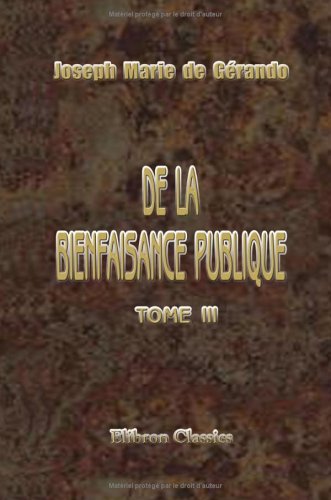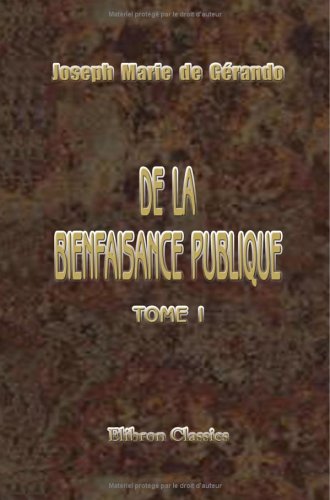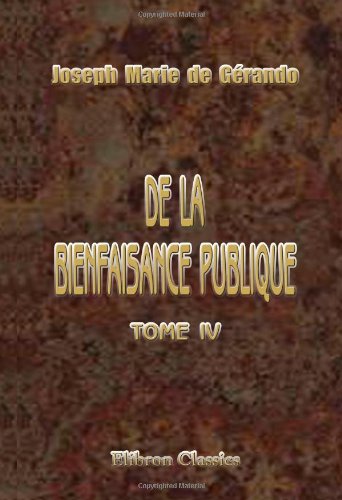Background
Joseph Marie de Gérando was born at Lyon on the 29th of February 1772.



(This Elibron Classics book is a facsimile reprint of a 18...)
This Elibron Classics book is a facsimile reprint of a 1839 edition by Jules Renouard et Cie, Paris.
http://www.amazon.com/gp/product/0543994686/?tag=2022091-20

(This Elibron Classics book is a facsimile reprint of a 18...)
This Elibron Classics book is a facsimile reprint of a 1839 edition by Jules Renouard et Cie, Paris.
http://www.amazon.com/gp/product/1421215535/?tag=2022091-20

(This Elibron Classics book is a facsimile reprint of a 18...)
This Elibron Classics book is a facsimile reprint of a 1839 edition by Jules Renouard et Cie, Paris.
http://www.amazon.com/gp/product/1421215497/?tag=2022091-20

(This book was originally published prior to 1923, and rep...)
This book was originally published prior to 1923, and represents a reproduction of an important historical work, maintaining the same format as the original work. While some publishers have opted to apply OCR (optical character recognition) technology to the process, we believe this leads to sub-optimal results (frequent typographical errors, strange characters and confusing formatting) and does not adequately preserve the historical character of the original artifact. We believe this work is culturally important in its original archival form. While we strive to adequately clean and digitally enhance the original work, there are occasionally instances where imperfections such as blurred or missing pages, poor pictures or errant marks may have been introduced due to either the quality of the original work or the scanning process itself. Despite these occasional imperfections, we have brought it back into print as part of our ongoing global book preservation commitment, providing customers with access to the best possible historical reprints. We appreciate your understanding of these occasional imperfections, and sincerely hope you enjoy seeing the book in a format as close as possible to that intended by the original publisher.
http://www.amazon.com/gp/product/B009SLGOS4/?tag=2022091-20

(This Elibron Classics book is a facsimile reprint of a 18...)
This Elibron Classics book is a facsimile reprint of a 1839 edition by Jules Renouard et Cie, Paris.
http://www.amazon.com/gp/product/0543963462/?tag=2022091-20
jurist philanthropist philosopher
Joseph Marie de Gérando was born at Lyon on the 29th of February 1772.
When the city was besieged in 1793 by the armies of the Republic, de Gerando took up arms, was made prisoner and with difficulty escaped with his life. He took refuge in Switzerland, whence he afterwards fled to Naples. In 1796 the establishment of the Directory allowed him to return to France. At the age of twenty- five he enlisted as a private in a cavalry regiment. About this time the Institute proposed as a subject for an essay this question, -" What is the influence of symbols on the faculty of thought ? " De Gerando gained the prize, and heard of his success after the battle of Zurich, in which he had distinguished himself. This literary triumph was the first step in his upward career. In 1799 he was attached to the ministry of the interior by Lucien Bonaparte; in 1804 he became general secretary under Champagny; in 1805 he accompanied Napoleon into Italy; in 1808 he was nominated master of requests; in 1811 he received the title of councillor of state; and in the following year he was appointed governor of Catalonia. On the overthrow of the empire, de Gerando was allowed to retain this office; but having been sent during the hundred days into the department of the Moselle to organize the defence of that district, he was punished at the second Restoration by a few months of neglect. Ha was soon after, however, readmitted into the council of state, , where he distinguished himself by the prudence and conciliatory tendency of his views. In 1819 he opened at the law-school of Paris a class of public and administrative law, which in 1822 was suppressed by government, but was reopened six years later under the Martignac ministry. He died at Paris on the 9th of November 1842.
He is most remembered for his 1804 book Histoire comparée des systèmes de philosophie, considérés relativement aux principes des connaissances humaines (Comparative History of philosophical systems, considered in relation to the principles of human knowledge) as well as his 1820 study of benevolent activity, Le visiteur du pauvre (The visitor to the poor).
In 1837 he was made a baron.
(This book was originally published prior to 1923, and rep...)
(This Elibron Classics book is a facsimile reprint of a 18...)
(This Elibron Classics book is a facsimile reprint of a 18...)
(This Elibron Classics book is a facsimile reprint of a 18...)
(This Elibron Classics book is a facsimile reprint of a 18...)
He was a fellow of the Royal Society of Edinburgh.
